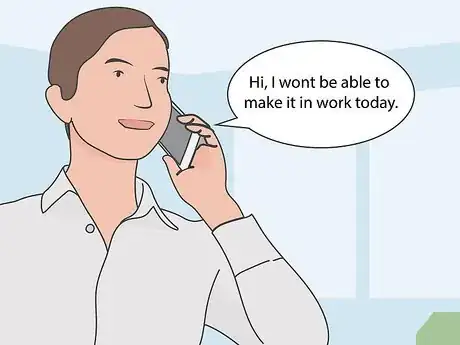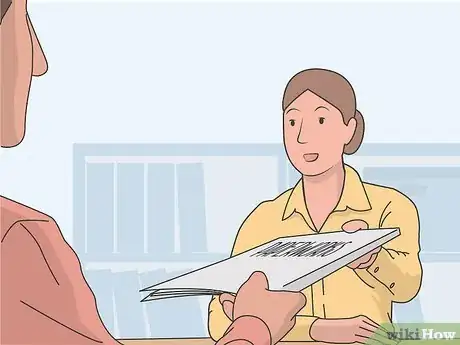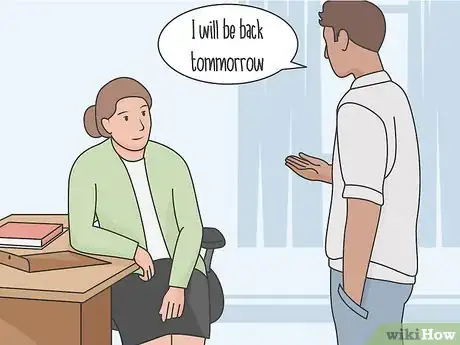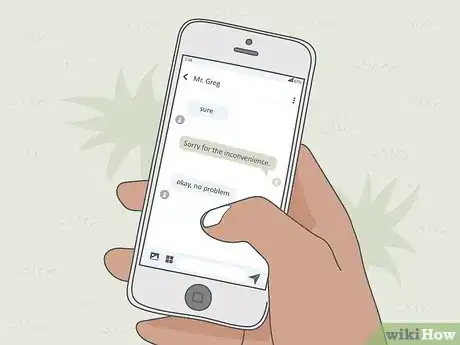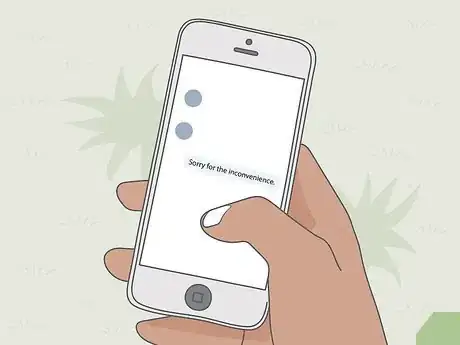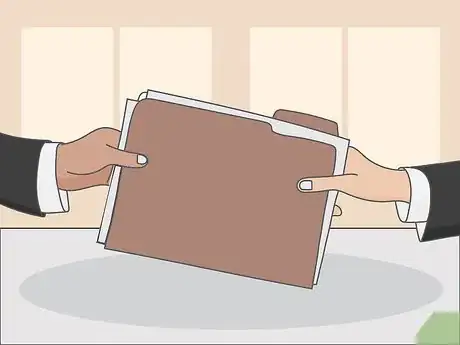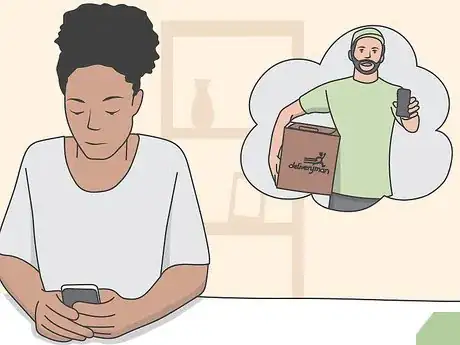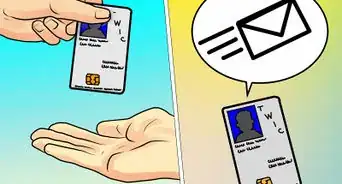This article was co-authored by Jeffrey Fermin. Jeffrey Fermin is a Performance Marketing Manager based in Miami, Florida, who currently works for AllVoices. He’s also the Founder of a full-service marketing company called New Theory. With over 10 years of experience, he specializes in digital marketing and content creation. He earned a Bachelor’s Degree in Psychology and a Bachelor of Education from Florida International University. Jeffrey has won a Microsoft Octas Innovation Award and is a TechCrunch Disrupt Runner-Up.
There are 11 references cited in this article, which can be found at the bottom of the page.
This article has been viewed 59,586 times.
While it's best to have a legitimate excuse for missing work, sometimes you may just really want to stay home. In most cases, it's probably enough to simply say that you won't be coming in. However, since your employer may be legally entitled to ask you for more information, you may want to prepare an excuse ahead of time, just in case. If you typically have good attendance at work and you come back to work ready to take on your responsibilities, chances are, no one will think twice about your extra day off!
Steps
Communicating with Your Employer
-
1Ask a co-worker to take over your workload for the day, if possible. Before you call out, it can help if you have someone already lined up to take care of your work for the day. For instance, you might have someone cover your shift if you work in the service industry, or you might ask one of your co-workers to fill out some paperwork that you would normally need to do that day. This may help to ensure that your work gets done and lessen the impact of taking a day off.[1]
- For instance, you might text your co-worker and say, “Hey Chris, I won't be in today. Could you sign off on the accounting report that Steph will be sending over later?”
- If you explain to your co-worker why you aren't coming in, make sure it's the same excuse you give your boss in case they talk about it later.
- Finding someone to cover your shift is often required if you work in the service industry.
Tip: If your job involves elements that can be done remotely (such as computer work), you might be able to stay home and still get some work done. Find out about the work-from-home policies at your job, and take advantage of them.
-
2Follow your workplace's rules for taking a day off. Generally, you should call or email your place of work as soon as possible if you plan to miss a day. However, if there are any guidelines about how much notice you have to give before you call out, be sure to follow those. If you violate your work's call-out policy, you could face disciplinary action, and it may even cost you your job.[2]
- For instance, your employer may require that you call out at least 3 hours before your shift.
- Your company's attendance policy may also dictate how often you're allowed to miss work.
Tip: Check to see if you have any available personal or sick days you can use. This will ensure that you get paid despite taking a day off and it may also add legitimacy to your request since you are entitled to use this time as needed.
Advertisement -
3Call or email your place of work as soon as possible. Once you've decided you're going to take the day off, contact your employer immediately to let them know. It's most professional to call and speak to someone in person, although excusing yourself through an email notice may also be acceptable, depending on your company's policy on call-outs.[3]
- Start your call or email by saying something like, “Hi Derek, I won’t be able to make it in to work today.”
- If you already communicate with your bosses primarily through text or email, then it's probably fine to excuse yourself from work that way. However, if your boss rarely checks their email, it's probably not a good idea use an email to call out, since they may not see it before your shift starts.[4]
-
4Say that something came up without going into too much detail. If you rarely excuse yourself from work, your employer may ask why you won't be in. However, saying that something came up will let them know that you do have a reason, even if you don't share the details.[5]
- Try saying, “I'm sorry, but something came up that I have to take care of," for instance.
-
5Provide any information that may help others to cover your job. Consider doing this if you are in the midst of a project or if someone else will need to take over your job for the day. Is there anything you could tell your boss or coworkers that might make it easier for them to cover your responsibilities for the day? If so, let them know.[6]
- Say something like, “I am in the middle of filing a big project. If you want someone to keep working on that, the paperwork is sitting on my desk.”
-
6State when you expect to be back to work. Give your employer at least a general idea of when your situation will resolve, but leave things open-ended in case you need another day. Mention that you expect to be back tomorrow, but that you’ll be in touch.[7]
- For example, you might say something like, “I should be back to work tomorrow morning, but I’ll let you know if that changes.”
-
7Apologize to those who may be inconvenienced by your absence. Finally, include an apology since your absence may cause issues for your boss and coworkers. They may need to find someone to cover for you or pick up where you left off on a project. Don’t apologize profusely, though. One apology is plenty.[8]
- You could close an email by saying, “I’m sorry for any inconvenience my absence causes,” for example, or end a phone message with, “Sorry for the inconvenience.”
Offering Reasons for Missing Work
-
1Provide additional information only if your employer requests it. In the United States, employers are permitted to ask their employees for more details if they call in to excuse themselves from work. This may include requiring that you tell them what’s wrong if you’re feeling sick, and possibly even requesting that you submit a doctor’s note upon your return. However, they may not request additional information at all, especially if you rarely excuse yourself from work.[9]
- Keep in mind that you may be protected under the Americans With Disabilities Act if you have an ADA-protected condition and have disclosed this disability to your employer previously.
-
2Tell your boss how you're feeling if you say you're sick. The most common reason people call out of work is because they aren't feeling well, so this is easy to use as a go-to excuse. You may be able to simply say, "I'm sick and won't be in today." You don't need to say much more than that, but if your boss inquires how you're feeling, you may need to add in a little more detail to make your excuse more believable.[10]
- For example, you might say something like, “I’ve got a bad cold.” Or, you might say, “I’m nauseous and dehydrated.”
- Leave out any details that are too personal, such as that you have diarrhea, menstrual cramps, or tons of mucus.
- If you're planning on being out and about during the day, avoid using illness as an excuse for missing work, just in case you accidentally bump into a co-worker or client who might mention seeing you.
-
3Explain that you have a doctor's appointment if you want to call out in advance. If you know ahead of time that there's a certain day you'd like to take off, tell your boss that you have an appointment scheduled. To ensure you get the whole day, you might tell the doctor that you have to have tests done, and you're not sure how long they will take.[11]
- For example, you might say something like, “I have a doctor's appointment this Friday at 2:00 pm, so I won't be in that day.”
- Or you might say, “I have a doctor’s appointment with a specialist on Thursday and the doctor’s office is about 2 hours away, so I won’t be able to come in to work.”
- In some cases, your employer may require you to provide a written doctor's note to prove you were really there. If this is the case, only use this excuse when you really do have an appointment. You may still be able to leverage a short appointment into a whole day off!
-
4Consider describing a home repair issue that needs your attention. Home emergencies often require that someone be home to tend to them, especially if they require professional repair. In addition, this doesn't require you to pretend that you or someone else is sick, and it would be difficult for anyone to double-check your story.[12]
- For example, you might say something like, “My water heater is broken and I’m waiting for the plumber to arrive. I have to be at home while he’s working on it.”
- Or, you might say something like, “My basement flooded and I am draining it, but it will take a few hours.”
-
5Tell your employer you have to stay home to sign for a delivery. Some packages require that someone sign for them before they can be delivered, so this may be a reasonable excuse for why you have to miss work. Typically, you'll be given a window for the delivery, so you may tell your employer that you expect the package to be delivered during that time, and you need to be there to accept the delivery.[13]
- You could also say something like, “My new stove is being delivered on Monday, but they said it could be any time between 8:00 am and 5:00 pm.”
-
6Try being honest. Sometimes, you just need a day for your own mental health. If your boss is generally an understanding person and you have a good work record, you may just be able to explain that you need to take a break for the day, and that you plan to return as soon as possible. That way, you don't have to worry about pretending to be sick or keeping the details of your excuse straight later on. In addition, your employer might respect you more for being open and honest about why you're not coming in.[14]
- For instance, you might say, "I'm sorry for the short notice, but I've been feeling really stressed and I need to take a mental health day. I'll still be available to check emails if anything really important comes up though, and I'm expecting to be in the office tomorrow."
-
7Mention that you have a family emergency as a last resort. Missing work due to an issue with a sick family member, such as a parent, a child or a significant other, is a valid reason to give your employer. Tell them briefly what is going on and that your family member needs you to help them.[15]
- For example, you might say something like, “My daughter is sick and I need to stay home and take care of her.
- If you plan to take leave due to a family emergency, you'll likely need to provide legitimate documentation regarding the circumstances of your leave. However, for a single day, you likely won't be asked for this.
- Keep in mind that some people might not appreciate being given an imaginary illness just so you can miss work. Also, don't use this as an excuse if there's any chance that someone from your work may know the person in question, since it may come out later that they were never sick.
-
8Steer clear of outrageous stories and unbelievable circumstances. You want your boss to believe your excuse, so don't tell them anything too far-fetched, and avoid any explanations that would be easy for your boss to disprove. Also, avoid going into elaborate detail, since that will make it seem like you're trying too hard to sell the story.[16]
- For instance, don't tell your boss that you broke your leg. When you return to work and your leg is fine, they'll know that you lied, and your reputation at work will be damaged.
- Avoid making excuses about your vehicle. Your boss may simply ask you to call an Uber to get to work, or they may tell you that a co-worker can pick you up.
- Never make up a claim that someone has died as a way to excuse yourself. This is likely to backfire, especially if someone discovers later that the person is really still living.
Warnings
- Calling out of work can get you in trouble with your employer, so it's best not to miss work unless you really do have an emergency.⧼thumbs_response⧽
References
- ↑ https://www.inc.com/john-boitnott/what-your-boss-really-thinks-when-you-call-in-sick.html
- ↑ https://hrdailyadvisor.blr.com/2017/02/09/employers-can-enforce-call-policies-even-fmla/
- ↑ https://www.inhersight.com/blog/how-to/sick-day-email?_n=70596554#
- ↑ https://money.usnews.com/careers/articles/a-guide-to-calling-in-sick
- ↑ https://www.inc.com/quora/taking-a-day-off-its-best-to-skip-the-excuses.html
- ↑ https://www.inc.com/john-boitnott/what-your-boss-really-thinks-when-you-call-in-sick.html
- ↑ https://www.inc.com/quora/taking-a-day-off-its-best-to-skip-the-excuses.html
- ↑ https://www.inc.com/quora/taking-a-day-off-its-best-to-skip-the-excuses.html
- ↑ https://www.fastcompany.com/90440911/what-to-know-about-calling-out-sick-for-mental-health-reasons
- ↑ https://www.inhersight.com/blog/how-to/sick-day-email?_n=70596554#
- ↑ https://money.usnews.com/careers/articles/a-guide-to-calling-in-sick
- ↑ https://www.insidermonkey.com/blog/17-best-excuses-to-get-out-of-work-747295/?singlepage=1
- ↑ https://www.insidermonkey.com/blog/17-best-excuses-to-get-out-of-work-747295/?singlepage=1
- ↑ https://www.fastcompany.com/90440911/what-to-know-about-calling-out-sick-for-mental-health-reasons
- ↑ https://stepstojustice.ca/steps/employment-and-work/5-get-proof-about-needing-personal-emergency-leave/
- ↑ https://www.inc.com/quora/taking-a-day-off-its-best-to-skip-the-excuses.html
About This Article
Whether you have a legitimate reason for needing to miss work or just need a day off for yourself, you can easily excuse yourself from your job without attracting attention. Claiming that you have allergies, a migraine, or food poisoning are all good reasons to either not go to work or leave work early. If you don’t want to fake being sick, you can say that your elderly parents or children aren’t feeling well. For other family excuses, say you need to attend a wedding or a funeral. You can also tell your boss that your pet is ill and you need to take it to the vet. For days when you need extra time to get to work, tell your boss that you locked yourself out and are waiting for a locksmith or that you lost your car keys and will be in as soon as you can. To learn how to ask a coworker to cover your shift, keep reading!

